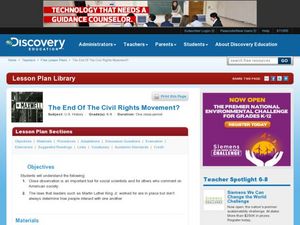Curated OER
Rights of the Accused in Search and Seizure
High schoolers explain the rationale behind the Fourth Amendment, and the types of activity regulated by the Constitution. They analyze situations, and explain a citizen's rights when an unlawful search or seizure is conducted.
Mr. Codega
Graphic Organizer: The Declaration of Independence
Help your young historians to analyze and break down the Declaration of Independence with this detailed graphic organizer. After reading the primary source, learners review the document's purpose, ideas about individual rights, major...
Curated OER
Relationships, Day 4: Friendships & Dating
It is so important to help special needs individuals know the difference between dating and friendship. They define friendship, differentiate between friends and strangers, role-play, practice greetings, then talk about dating. This...
Curated OER
Get to Know Your Bill of Rights
Sixth graders research and examine the first ten amendments to the Constitution of the United States of America. They sequence events significant to this time period, read and discuss text, and in small groups prepare and present the...
Curated OER
Property Rights: Soviet Farms
Students examine the problems with the collectivized agriculture program in the Soviet Union. They listen to a teacher-led lecture, participate in a property rights scenario activity, create a plan for maximizing the value of land, and...
Curated OER
Does It Looks All Right to Me?
Students explore the concept of philanthropy. In this service learning instructional activity, students examine the accomplishments of Civil Rights leaders' as works of philanthropy. Students read literature regarding diversity and study...
Curated OER
Should Your Hairstyle Be A Constitutional Right?
Students examine the 1st and 14th Amendments of the U.S. Constitution. In this U.S. government lesson, students read the Amendments and interpret them in order to respond to essential questions regarding constitutional rights.
Curated OER
The Fight for Human Rights
Students explore the concept of human rights by developing and defending their own 'Bills of Human Rights' and by writing a reflective essay that compares their notions of human rights and the protection of them.
Curated OER
Unsung Heroes of the Civil Rights Movement
Students analyze historic rulings that played roles in the Civil Rights Movement. In this civil right lesson, students research Internet and print sources regarding Plessy v. Ferguson, Sipuel v. Board of Regents of the University of...
Curated OER
Editorial Cartoons: Gay Rights
Students consider gay rights. In this editorial cartoon lesson, students analyze an editorial cartoon by identifying the idioms and puns in the cartoon. Students create their own editorial cartoons.
Curated OER
Where Do You Stand?
Scholars assess a government's ability to intervene in personal health decisions. They research basic facts about euthanasia and describe their opinions about new legislation passed in the United States Congress about an individual's...
Curated OER
Social and Cultural Issues in the Civil Rights Movement
Students watch videos, listen to speeches and analyze the information that is presented about the civil rights movement. They examine visual art of the period.
Curated OER
First Amendment Rights
Fifth graders participate in a problem-solving and decision-making process involving the First Amendment rights to analyze and implement a solution for a school-related issue. They are given a variety of scenarios to apply the First...
Curated OER
The End of the Civil Rights Movement
Students examine the relationships between blacks and whites in their community. In this racial discrimination lesson, students make race relations observations within their community and then write letters that reveal their observations...
Curated OER
Judges in the Classroom Lesson Plan History Of The Bill Of Rights
Students study the Bill of Rights and the US Constitution. They investigate the authors of the Bill of Rights and play a game based on the research.
Curated OER
History of the Bill of Rights
Students study the history of the Bill of Rights. In this Bill of Rights lesson, students read and use two handouts to learn about the history of the Bill of Rights. Students then work in groups to study the Bill of Rights. Students then...
Curated OER
Why a Bill of Rights? What Impact Does it Have?
Students explore the Bill of Rights. In this Bill of Rights lesson, students compare the Federalist view of government to the Anti-Federalist view of government. Students consider the impact of the bill of rights as they take notes on...
Curated OER
Documents of Natural Rights: The Declaration of Independence and The Plan of Delano
Eighth graders analyze the philosophy of government in the Declaration of Independence. As a class, they discuss how this philosophy has caused other revolutions in history and how well it supports our natural rights. In groups, they...
Curated OER
The Ongoing Debate: Crime Control v. Due Process Protection
Learners investigate the Exclusionary Rule and other ways of to enforce the protections found in the Bill of Rights. They study how effective criminal control and public safety is carried out while citizens Constitutional rights are...
Curated OER
Supreme Court Case Study: District of Columbia Vs Heller
Examine the Supreme Court case, District of Columbia vs Heller, to build a better understanding of the Bill of Rights. Learners visit three different websites, read the provided informational text, and then answer a series of critical...
Curated OER
Stories of Freedom and Justice: Learning Resources
Students are introduce to the topic of nonviolence and civil rights by watching a video. In this stories of freedom lesson, students examine the Supreme Court's role in interpreting the U.S. Constitution. Students analyze how conflict...
Annenberg Foundation
Egalitarian America
What does a true American represent? Scholars investigate the equal rights era of the 1960s and 1970s in the 20th installment of a 22-part series on American history. Using photographic, magazine, written, and video evidence, groups...
PBS
March on Washington: A Time for Change
Young historians conclude their study of the events that lead up to and the planning for the March on Washington. After examining videos and primary source documents, they consider the civil rights objectives that still need to be...
State Bar of Texas
Miranda v. Arizona
You have the right to remain silent—but why? Scholars analyze the nature of what has become known as the Miranda Rights. A short video along with paired group work and discussion opens the issue of the rights of the accused upon arrest....

























